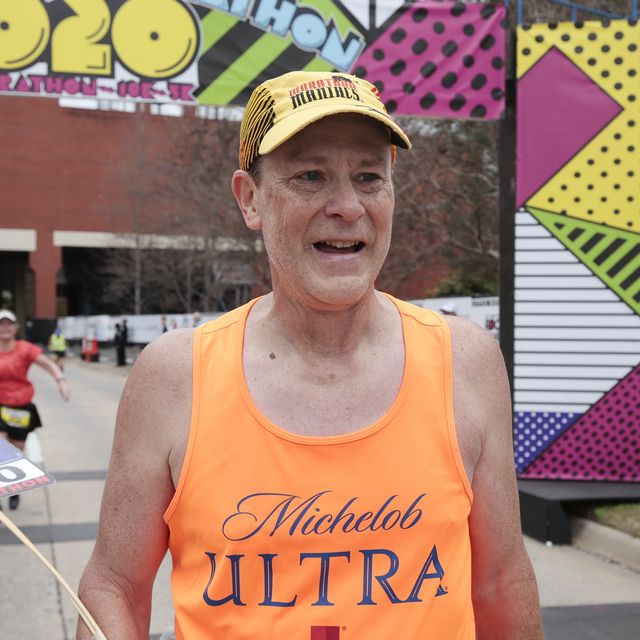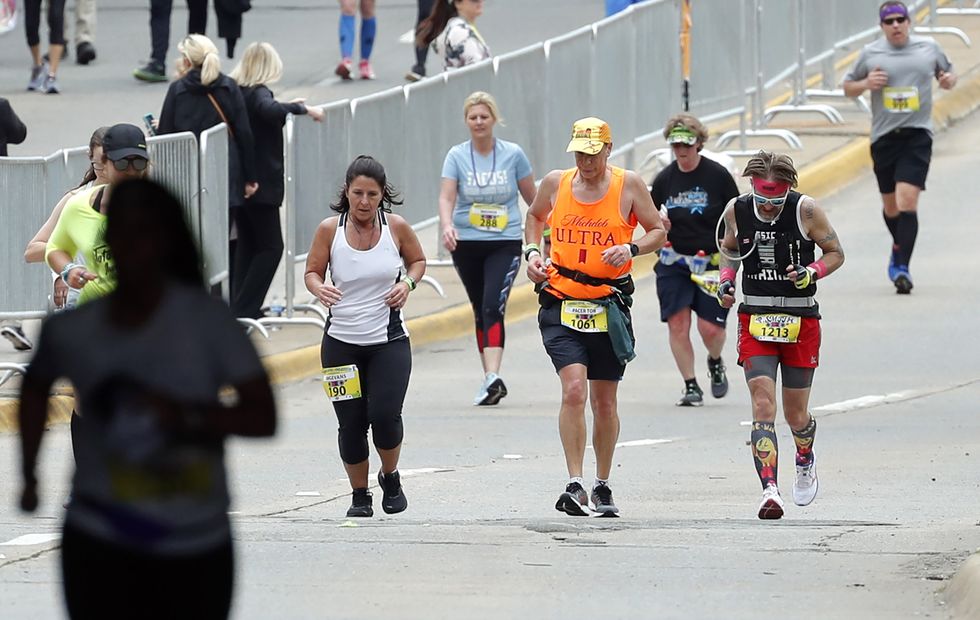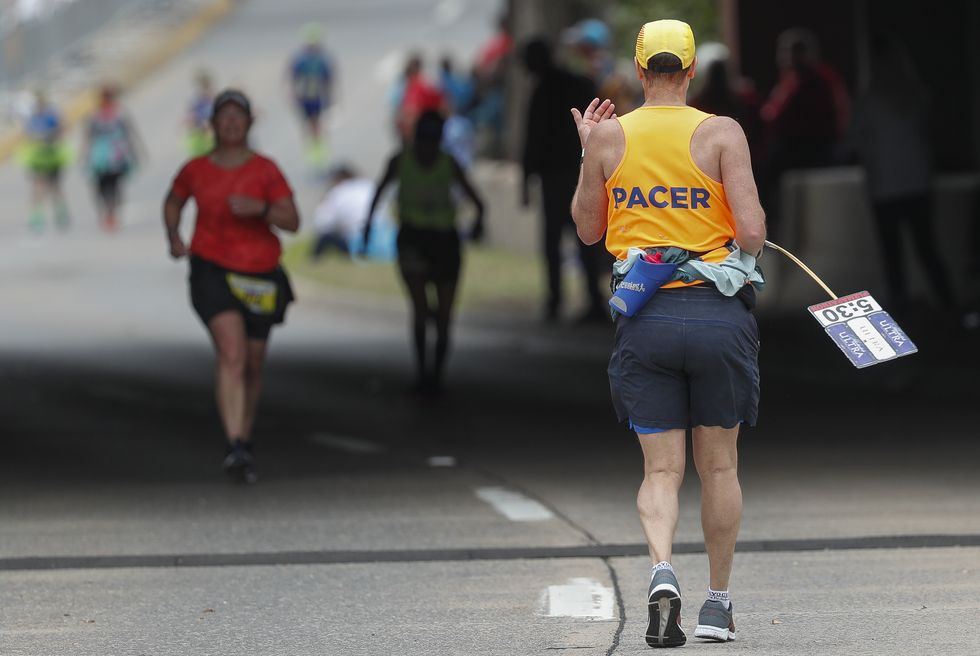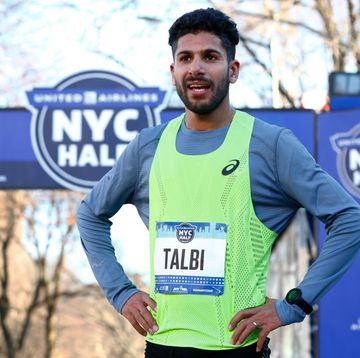Tom Perri knew something was wrong when his pace started slowing. In the spring of 2018, he was coming up on mile 19 during a marathon in Wisconsin when he suddenly felt heavy and fatigued. He was aiming for a 4:30 finish time—a perfectly comfortable pace for the 3:55 marathoner—but his legs wouldn’t turn over.
“I had never felt that before,” Perri, 58, told Runner’s World. As was typical for the frequent racer, the Maple Grove, Minnesota native ran several more 26.2s that year, but each race got slower. “I figured it was Lyme disease or something.”
But after Perri had bloodwork done during a physical in late December of 2018, his doctor called for a biopsy on his prostate. Then Perri received shocking news: he had prostate cancer, which originates in the prostate gland and often spreads quickly throughout the body.
“I was really surprised, because other than my fatigue, I didn’t have any symptoms,” he said. “I was healthy.”
At the time, Perri had never gone more than four days without running since 1975. In his lifetime, he has logged more than 100,000 miles, raced in more than 2,000 races, finished a sub-4:00 marathon in all 50 states, and paced over 1,000 events, he said.
When he first received his diagnosis, Perri’s first concern was how the disease would affect his running. Luckily, his physician assistant, who races Ironman triathlons, understood how important Perri’s daily miles were to him. Perri was told that he was allowed to walk-run as long as he was careful not to overexert himself.
Perri took the advice to heart and kept pounding the pavement. Since his diagnosis, he has completed 40 marathons, the latest of which was the 2020 Little Rock Marathon. On Sunday, March 1, he paced the 5:30 group all the way to the finish line in Arkansas.
Always Running
Perri’s first introduction to racing was during middle school in his Minnesota hometown, when he would line up for mile races during P.E. class. In high school, he joined the high school cross-country and track teams, but never took the racing part of the sport too seriously.
“For me, it was more of a social thing,” he said. “I liked talking to other people during runs and being around everyone on race day. Running gave me my social network.”
Perri continued running recreationally through college at St. Thomas College, where he studied English and psychology, and at graduate school at St Mary’s University, where he received master’s degrees in suicidology and human development. During this time, he also began volunteering as a pacer in 5Ks and 10Ks. “Pacing was my way of connecting with people,” he said.
In 1993, when he was 31, he decided to race his first 26.2 at the Twin Cities Marathon. The night before the race, he drove from his home to Minneapolis, Minnesota, slept for a few hours in his car, then changed into his gear and headed to the start line.
“I had never ran more than a half marathon at the time,” he said. “I had a great race until about mile 17, when my feet got so sore and blistered that I had to start walking. I still finished, though.”
Perri was hooked after that first race. Even more than the running part, he loved the community atmosphere of marathons—the thousands of runners toeing the line and spectators lining the course. As a single man with a time-intensive job as an academic researcher, the events offered an opportunity to socialize.
After finishing several marathons in the 1990s, Perri began to pace 26.2s, usually leading groups finishing between four and five hours.
“That’s just what I did on the weekends,” he said. “I loved it. Seeing the expressions on people’s faces when they BQ’d or finished a marathon for the first time ever was an incredible thing.”
Training Through Treatment
In April 2019, a few months after Perri was diagnosed with cancer, he went in for surgery to remove his prostate. The goal was to stop the cancer in its tracks before it spread to other parts of his body. But during a checkup later in July, he learned the devastating news that he now had stage four cancer, as it had spread to his bladder.
That July, he took a week off from running—the most time off he’s ever taken since he started running. His cancer treatment called for 38 rounds of radiation and medication to treat his symptoms, which included fatigue, headaches, dizziness, and gastrointestinal issues. In October, he underwent a second surgery on his bladder.
Between these operations and treatments, Perri continued to lace up to run, but he modified his workouts according to how he felt. Instead of long runs, he did shorter walk-jogs with 60-second speed bursts. His doctors told him that he’d only be able to run at 20 to 25 percent of his former ability.
“Some days, the fatigue would be so bad that I could only run or walk for 15 minutes,” Perri said.
Still, Perri rallied for marathons. On one occasion, he raced a marathon just 17 hours after radiation. Last November, he helped lead the 4:30 group at the New York City Marathon. The races aren’t as easy as they used to be, however, because he had to cope with cancer’s side effects—such as stomach issues and tired legs.
“I’ve adjusted my pace and nutrition strategy,” he said. “I keep my pace slower. I find that I get tired around the three-hour mark in a marathon, so I’ll take a 5-Hour Energy shot then. And I try not to avoid drinking too much, since I have to stop for the bathroom more now. But I know I can still do it. I can still finish.”
At the Little Rock Marathon this month, Perri crossed the line in 5:29:23, right on pace. Afterward, he headed back onto the course to run with the folks who had dropped off the group.
“[Perri] stayed on the pace he was committed to, then [remained] in the race with the people he had run with. That says a lot about his character,” Alice Stewart, the media director for the Little Rock Marathon, told Runner’s World.
Stewart continued, “He exemplifies the spirit of the marathon world. He never once complained about the fact that he has cancer. It really makes you think about complaining about stubbing your toe.”
Looking Ahead
On May 13, Perri will undergo another screening to see how the radiation rounds have affected the cancer. He’s expecting either good news (the cancer cells are killed), okay news (the cells have been slowed down), or bad news (the cancer has spread).
“If I get good news, I’m going to continue working toward the goals I set for myself awhile ago,” he said. His goals include running two sub-4:00 marathons in each state and completing all six World Major Marathons twice. “I like to do things in twos.”
If he gets bad news, he’s going to fill his calendar with the remaining races on his bucket list—the Antarctic Marathon, the Great Barrier Reef Marathon, and the North Pole Marathon
“I’ve always been driven,” he said. “But I know there’s a line between helping and hurting myself. Running makes me happy and lets me help others and socialize, which is the most important thing for me right now.”

Hailey first got hooked on running news as an intern with Running Times, and now she reports on elite runners and cyclists, feel-good stories, and training pieces for Runner's World and Bicycling magazines.















